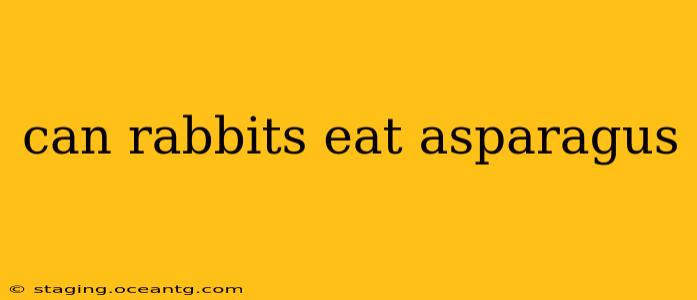Asparagus is a delicious and nutritious vegetable for humans, but what about our furry friends, rabbits? The short answer is: yes, rabbits can eat asparagus, but in moderation and with careful preparation. While it offers some nutritional benefits, it's crucial to understand how to safely introduce it into your rabbit's diet.
This guide will explore the nutritional value of asparagus for rabbits, address potential risks, and offer practical advice on how to feed it to your bunny safely and effectively.
Is Asparagus Good for Rabbits?
Asparagus is a good source of vitamins A and K, as well as fiber. These nutrients can contribute to a rabbit's overall health. Vitamin A is crucial for maintaining healthy vision and a strong immune system, while vitamin K is essential for blood clotting. Fiber is also vital for healthy digestion in rabbits, promoting regular bowel movements and preventing digestive issues.
However, it's important to remember that asparagus shouldn't constitute a significant part of a rabbit's diet. Hay should always make up the bulk of their food intake (80-90%), with fresh vegetables comprising a smaller portion (10-20%).
What are the Risks of Feeding Rabbits Asparagus?
While generally safe, asparagus can present some risks if not handled correctly:
- Oxalates: Asparagus contains oxalates, which can bind to calcium and potentially hinder its absorption. This isn't usually a problem for healthy adult rabbits with a balanced diet, but excessive consumption could lead to issues in the long run. Therefore, moderation is key.
- Digestive Upset: Introducing new foods too quickly can upset a rabbit's sensitive digestive system. Start with small amounts of asparagus and monitor your rabbit closely for any signs of digestive distress, such as diarrhea, gas, or loss of appetite.
- Pesticide Residue: Commercially grown asparagus may contain pesticide residues. Always wash the asparagus thoroughly before feeding it to your rabbit to minimize exposure to harmful chemicals. Opt for organically grown asparagus whenever possible.
How Much Asparagus Can a Rabbit Eat?
The amount of asparagus you should feed your rabbit depends on its size, age, and overall health. A good rule of thumb is to start with a small amount – a few small pieces – and gradually increase the quantity over several days, always observing your rabbit's reaction. Never feed more than a small handful (around 2-3 spears) a day, and only as a small part of their overall vegetable intake.
Can Baby Rabbits Eat Asparagus?
It's generally recommended to avoid feeding asparagus to baby rabbits (under 6 months old). Their digestive systems are still developing, and they are more susceptible to digestive upset from new foods. Stick to a diet primarily consisting of hay and a small amount of safe, familiar vegetables appropriate for their age.
What Other Vegetables Can Rabbits Eat?
Rabbits enjoy a variety of safe vegetables, and a diverse diet is beneficial for their health. Good options include:
- Leafy Greens: Romaine lettuce, parsley, cilantro, basil
- Cruciferous Vegetables: Broccoli florets (in moderation), kale (in moderation), cabbage (in moderation)
- Root Vegetables: Carrots (in moderation), parsley root
- Other Vegetables: Bell peppers (in moderation), cucumber (in moderation), zucchini
Remember to always introduce new foods gradually and monitor your rabbit for any adverse reactions.
Can Rabbits Eat Asparagus Peels?
No, it’s best to avoid feeding your rabbit asparagus peels. The peels are tougher to digest and may pose a choking hazard. Always feed only the tender parts of the asparagus spear.
Conclusion
Asparagus can be a healthy addition to a rabbit's diet in small quantities, offering valuable nutrients. However, moderation, proper preparation, and careful monitoring are crucial to ensure its safe consumption and prevent potential health problems. Always prioritize a diet primarily consisting of high-quality hay, and consult with a veterinarian or rabbit expert if you have any concerns about your rabbit's diet.
